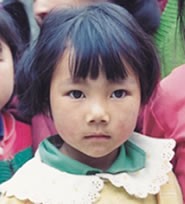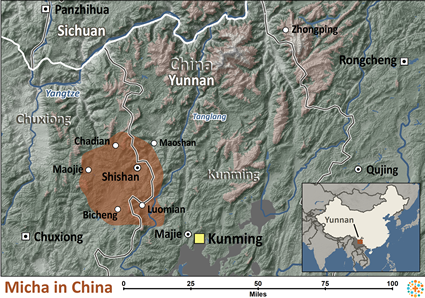The Micha have been officially counted as part of the Yi nationality in China. It is uncertain how they relate to other Yi groups. Because of their similar names, it is possible the Micha were once related to the Michi people who live much farther east in Chuxiong Prefecture of Yunnan.
The Mitcha (Micha) were mentioned in an early book as one of only two people groups in Yunnan that the Yi were willing to marry, the other being the Bai. In turn, the Micha refused to intermarry with anyone except the Bai and the Lisu. Today most Micha are hard-working agriculturists who prefer to be left alone in their mountain community. Many of their young people prefer to move to the cities and towns where they can earn more money and to return home periodically for festivals and special occasions.
After living alongside the Han Chinese and Bai for many centuries, the Micha have absorbed many of the religious practices of their neighbors, including aspects of Daoism, Buddhism, and ancestor worship. Little remains of the traditional polytheistic beliefs of the Micha, although the elderly still worship various spirits including the spirit of the village which they believe resides in the largest tree near the community.
There is a small smattering of Three-Self (government sanctioned) churches throughout the area, as well as some Catholic influence. The Micha, however, being a small and isolated group, are not exposed to Christian witness.
Without the guidance of Christ, these people are like sheep without a shepherd. They need the good shepherd in their families and communities.
Pray for the spiritual blindness and bondage to the evil one to be removed so they can understand and respond to Christ.
Pray for the Lord to provide for their physical and spiritual needs as a testimony of his power and love.
Pray that the Micha people will have a spiritual hunger that will open their hearts to the King of kings.
Pray for an unstoppable movement to Christ among them.
Scripture Prayers for the Micha in China.
Operation China, Asia Harvest, Copyrighted © Used with permission
| Profile Source: Joshua Project |

























